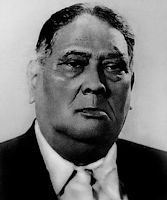 |
| A.K. Fazlul Huq |
Full Name: Abul Kasem Fazlul Hauq.
A.K. Fazlul Huq was born on 26 October 1873 at Jhalokati, Bangladesh. He was a lawyer, legislator and statesman in 20th century. He was a major political figure in British India and later Pakistan (East Pakistan now Bangladesh). He was one of the most reputed lawyers in the High Court of Calcutta and High Court of Dhaka. He was an alumni of the University of Calcutta. He worked in the regional civil service and began his political career in Eastern Bengal and Assam in 1906. He was first elected to the Bengal Legislative Council from Dhaka in 1913; and served on the council for 21 years until 1934. He was a member of the Central Legislative Assembly for 2 years, between 1934 and 1936. For ten years between 1937 and 1947, he was an elected member of the Bengal Legislative Assembly, where he was Prime Minister and Leader of the House for 6 years. He was later elected to East Bengal Legislative Assembly, where he was Chief Minister for 2 months; and to the Constituent Assembly of Pakistan, where he was home Minister for one year in 1950. Huq boycotted titles and knighthood granted by the British Government. He is popularly known with the title of Sher-e-Bangla (Tiger of Bengal). He was notable for his English oratory during speeches to the Bengali legislature. Huq courted the votes of the Bengali middle classes and rural communities. He pushed for land reform and curbing the influence of Zamidars. Huq was considered a leftist and social democrat on the political spectrum. His ministries were marked by intense factional infighting. In 1940, Huq had one of his most notable political achievements, when he presented the Lahore Resolution. During the Second World War, Huq joined the Viceroy of India's defense council and supported Allied war efforts. Under pressure from the Governor of Bengal during the Quit India movement and after the withdrawal of the Hindu Mahasabha from his cabinet, Huq resigned from the post of premier in March 1943. In the Dominion of Pakistan, Huq worked for five years as East Bengal's attorney general and participated in the Bengali Language movement. He was elected as chief minister, served as federal minister and was a provincial governor in 1950. He became secretary of the Bengal Provincial Muslim League in 1913. In 1929, he founded the All Bengal Tenants Association, which evolved into a political platform, including as a part of the post-partition United Front. Huq held important political offices in the subcontinent, including Present of the All India Muslim League.